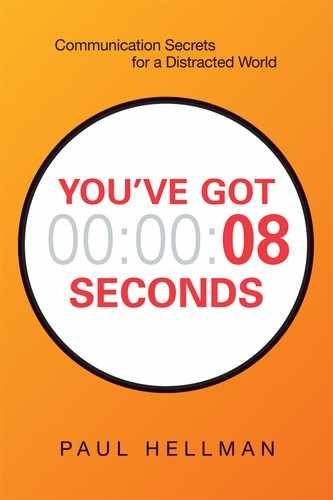|CHAPTER 3|
Three More Ways to Focus
“Everything should be made as simple as possible, but not simpler.”
Only Got a Minute? Start with Your Conclusion
Imagine that your job is to analyze bonds. You work for a global money management company, and every day, you go to a fast-paced morning meeting with 30+ colleagues and senior executives.
You’ve got one to two minutes, at most, to speak about a particular bond.
Here’s what your audience wants to know: Should we buy the bond, or not—and why? What they don’t want: irrelevant details.
Sounds simple, but takes skill and practice.
One of my consulting projects was to work with these analysts. I asked the chief investment officer, Bill Adams, who runs the morning meetings, “What does a good message sound like?”
“Simple,” Bill said. “First, give me your conclusion. Then tell me how you got there. Then give me your conclusion again.”
The next time you’re speaking (or writing) to senior executives, begin at the end.
Talking about Your Accomplishments? Tell a Story
Sooner or later, someone’s going to ask you what you’ve accomplished. You could be anywhere—a job interview, a performance appraisal, a parole hearing.
What’s an accomplishment, anyway? Consider the following:
a. Getting out of bed (on a day when you were really sleepy)
b. Making $1 million
c. Performing brain surgery
An accomplishment needs three things: obstacles, skillful action, results. In other words, you take action, overcome obstacles, and get results. By that measure, none of the list items definitely makes the cut.
a. Getting out of bed has obstacles, and plenty of them, but that’s about it.
b. Making $1 million could qualify. But maybe you took a $10 million business and ran it into the ground. Or maybe you won the lottery.
c. Brain surgery sounds impressive. When people try to reassure you about other tasks, they say, “Look, it’s not brain surgery.” That calms you down, unless you happen to be a brain surgeon:
DOCTOR: So, what’s on the schedule today?
ASSISTANT: In 10 minutes, you’re doing brain surgery.
DOCTOR: Oh, no!!!
Is brain surgery an accomplishment? Well, what were the results? Did you actually get the brain back in the head? How’s it working?
To make your accomplishments work, tell their story. But stay focused—use the acronym SOAR.
S is the Situation; here’s where you describe the context. OAR refers to that trio we discussed previously: Obstacles, Action, and Results. These three pull your accomplishment along.
Suppose, for example, you worked as an account exec at a PR firm, and you happened to be my daughter, who, at the time, was just out of college. An accomplishment might sound like this:
![]() Situation: Needed to get PR for an important client; no one had been successful despite lots of effort.
Situation: Needed to get PR for an important client; no one had been successful despite lots of effort.
![]() Obstacle: Client was thinly covered by the media, and the few reporters covering it kept getting reassigned.
Obstacle: Client was thinly covered by the media, and the few reporters covering it kept getting reassigned.
![]() Action: Identified new media targets, developed relationships, and persisted.
Action: Identified new media targets, developed relationships, and persisted.
![]() Result: Scored two important media meetings for the client’s CEO. Client was so pleased that they increased the PR budget.
Result: Scored two important media meetings for the client’s CEO. Client was so pleased that they increased the PR budget.
SOAR will focus your story. If you stick to what happened, you’re not bragging, just reporting.
And remember, it’s not brain surgery.
Giving Feedback? Try the XYZ Format
“My neck,” the manager said, “is on the guillotine.”
This manager had an influence problem. It involved a project team that didn’t report to him, but he was accountable for the results.
I was coaching him on what to say. His first draft: “When a project goes bad, I feel distraught, because of my neck . . .”
Years ago, I learned, and then modified, a method for stating your case from an excellent book: People Skills1. The format (modified) sounds like this: “When X happens, I feel Y, because of Z.”
X is the problem; Y, your reaction; Z, the business impact.
Let’s critique the guillotined manager’s XYZ:
X: “When a project goes bad.”
Plus: His X avoids attacking or blaming. He didn’t say, “WHEN YOU SCREW UP A PROJECT.”
Minus: What does he mean by “a project goes bad?”
I picture food that’s gone bad. No longer recognizable, it’s buried in the office refrigerator like an archaeological relic.
You wonder, what food group could this possibly have belonged to?
It’s best not to wonder, either about food or messages.
Let’s be specific. What the manager really meant was, “When we miss a deadline.”
Fine, say that.
Y: “I feel distraught.”
Plus: Saying how you feel tells others that the issue is important.
Minus: “Distraught” is too emotional for business. It’s like saying, “When we miss a deadline, I FEEL SO ABANDONED BY YOU.”
That’s heavy.
What’s a business-appropriate emotion? Try concerned.
You can be concerned that the project is late, concerned that customers will be unhappy, concerned that, in a moment of despair, you’ll probably eat the mystery food in the fridge and die of food poisoning.
Concerned covers it all with grace and, well, without any cause for concern.
Z: “Because my neck is on the line.”
Plus: Authentic.
Minus: The business impact should be larger than any of your body parts, or whether or not you, individually, look good.
Better: “Because our reputation is on the line” or “because, if we miss a deadline, that hurts our customers.”
Let’s pull this XYZ together: “When we miss a deadline, I get concerned about the effect on our customers.”
That’s focused.
